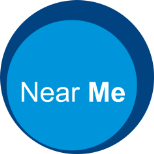A Scotland-wide engagement exercise gathered views from the public and professionals to support the national roll-out of the Near Me video consulting service.
Near Me is an online video consulting service that enables health and care appointments to take place at home or close to home. At the start of the pandemic (March 2020), a rapid scale-up plan was introduced to accelerate the use of Near Me across Scotland. The early development of Near Me had taken a co-design approach, with significant patient and professional involvement, so it was logical to carry out a national engagement exercise to support rolling it out across the country.
What we did
 The engagement had clear objectives:
The engagement had clear objectives:
- understand the potential benefits and barriers of using video consulting for health and care appointments
- understand the views of people who had never used Near Me
- identify potential improvements
- review governance arrangements
- raise awareness of how Near Me can be used
We sought advice from Healthcare Improvement Scotland, the Consultation Institute, and others. Discussions focused on possible approaches to carrying out engagement during a time of physical distancing. The approach taken was also guided by the Equality Impact Assessment (EQIA) which HIS Community Engagement carried out on the impact of COVID‑19 on engagement. This helped to identify engagement opportunities available to people who share protected characteristics, and those likely to face disadvantage.
We co-produced an EQIA with representatives from the 9 protected characteristics groups, to assess the potential impacts of protected characteristics, socio-economic factors, and remote and rural factors on the use of Near Me video consulting. Two virtual meetings were held and potential benefits and barriers were identified across the protected characteristics.
The public engagement was launched on social, local, and national media with tailored media releases for all territorial boards and issued to over 120 print, online and broadcast media across Scotland. This was a deliberate approach to try and reach more local audiences including those not online. The media releases included a telephone number and an email address for follow-up contact. Local media covered the story in all board areas. The interim Chief Medical Officer highlighted the engagement exercise within the First Minister's daily COVID-19 briefing which is televised across Scotland and the use of Near Me video consultations was covered on various BBC Radio Scotland programmes including phone-ins. NHS board Near Me leads, communications colleagues and others across all NHS board areas helped to raise the profile of the public engagement.
Stakeholder engagement took place with both public and health professional groups with over 300 organisations being invited to feed back to the public engagement. Although the vast majority of feedback was received via online surveys, the range of activities to engage other views was a key approach. Activities included: an online survey, hard copy surveys, telephone interviews, written responses, and focus groups. The Scottish Commission for Learning Disabilities prepared an Easy Read version of the public engagement survey and the British Deaf Association prepared a British Sign Language version of the survey.
In total, 5,400 responses were received. It is believed this is significantly more than any other public engagement or consultation in Scotland in recent times, including pre COVID-19.
Built into the approach was a multi-facetted plan to communicate the feedback. Anyone who had emailed responses or given feedback were sent links to the report and next steps; a media release was issued, and a successful webinar was hosted by NHS Education for Scotland (NES). Over 700 people attended the webinar and generated over 80 questions. Most individuals who posted a question were personally contacted with an answer. This was well received and allowed the topic to be explored in further detail. NES prepared and issued a Q&A to all who had registered for the webinar. Meetings were also arranged with all health boards to ensure there was ownership of the EQIA, understanding of the findings and to discuss local and national next steps.
What worked well
Throughout, the process was led and pro-actively managed and not administered. Anyone who got in touch got a personal response in as close to real time as possible. This was often greeted with welcome surprise and generated further discussions.
Using different engagement methods enabled a wide range of people to share their views including Marie Curie service users, people with learning disabilities, people whose first language is not English, and carers.
The approach worked well, with various organisations gathering feedback from their own service users and staff. This added to the richness of the findings including important differences in the benefits and barriers.
The engagement exercise demonstrated strong support for Near Me video consulting services from both the public and clinicians. All suggestions made to the Near Me team on how to improve engagement through non-digital means were actioned. Themes and recommendations were identified to improve accessibility, improve patient information and develop guidance to further embed the use of Near Me.
Challenges
There were some concerns raised about the restrictions on engagement methods caused by physical distancing.
While traditional methods like telephone and postal can be very effective to facilitate feedback, this was also problematic, as all staff carrying out the public engagement were working from home. There was also no mechanism in place to promote a free-phone number or a free-post address that could be easily serviced.
The bias towards women responding was evident early on and prompted some targeted awareness-raising on Twitter to male groups such as Men's Shed and others. The number of responses from ethnic groups was low.
Find out more
More information about the Near Me public engagement, including an EQIA and a report of the findings from the engagement exercises, can be found on the Technology Enabled Care website.
Contact
Maimie Thompson (Communications and Engagement Manager, Scottish Government - Technology Enabled Care)
Email: nss.nearme@nhs.scot
Illustration courtesy nearme.scot
